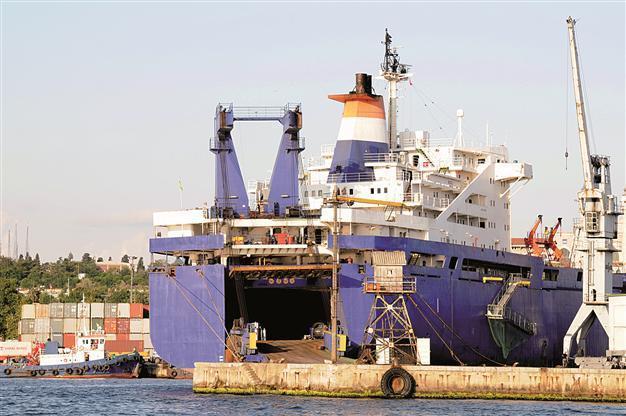Turkish ships turn to Suez to circumvent Egypt route
ISTANBUL- Hürriyet Daily News

Currently the vehicles unloaded from ships at Mediterranean ports of Egypt continue to Suez ports via convoys.
Ankara is set to launch a new route through the Suez Canal as an alternative for Turkish transporters and exporters who have faced setbacks in shipping to the Middle East via Egyptian harbors due to recent developments in the country.
“In order to prevent exports from halting and to enable access to those [Middle Eastern] markets, we will use the Suez Canal. We will give the necessary [financial] support,” Turkish Economy Minister Zafer Çağlayan recently told daily Hürriyet.
Roll-on/roll-off (ro-ro) services between the Mediterranean Turkish port of İskenderun and a number of Egyptian ports – mainly Alexandria and Port Said – which have been hit by political tension and bloody violence like other areas in the coup-torn country.
The issue is of particular concern as ro-ro services have been of great significance for Turkey’s trade with the Middle East since 2011, when the Syrian unrest first emerged.

The map below shows the current (red lines) and the planned
(blue dotted line) routes of Ro-Ro ships departing from Turkey’s
Iskenderun Port and heading to Saudi Arabia’s Duba Port.
The government solved the blockage caused by the problems with Syrian ports by activating ro-ro services from Mersin and İskenderun in southern Turkey, Çağlayan said.
“Using the Egyptian route was a little adventurous for us, but we did it and reached Saudi Arabia and other markets through the Red Sea,” he said.
Fatih Şener, executive board chairman of the Istanbul-based International Transporters Association (UND), told the Hürriyet Daily News by phone that switching to the Egyptian route had only been able to save the country 10,000 trips, as opposed to 40,000 when Syrian ports were used.
As such, both the government and Turkish exporters are not willing to lose already-reduced shipping to the Middle East.
Likely temporaryThe minister said keeping transportation to the Middle East going is critically important amid the pilgrimage season when the demand for certain goods soars to record highs.
Using the Suez route would be beneficial in this respect as most of the goods sent are food or agricultural products that require shorter shipping time, according to Şener.
There are two companies that have been making Ro-Ro trips between Turkey and Egypt twice a week since 2012, while 600 to 700 vehicles have been shipped first to Egypt and then to Saudi Arabia every month.
Until now, large-volume land transportation vehicles, which depart from İskenderun, have been carried to Port Said before traveling to the southern shore of the country on tiers for about 180 kilometers to be reloaded onto a new Ro-Ro that carries them to their final destination, Saudi Arabian ports.
“If the new route to pass through the Suez proceeds regularly, it will be a relief for transporters and free them from a huge burden,” Şener said.
The economy ministry is now working on overcoming the obstacles on the Suez route.
“The Suez has particular characteristics. The ship tonnages passing thorough there is different and in addition to that, the passage fees are very high,” Çağlayan said.
The expenses of using the new route will be covered by the government to support Turkish exporters and transporters.
Despite welcoming the move, Şener said the new route seemed likely to remain only temporary as Ankara will not choose to continue footing the costs of shipping through the Suez.
“The passage fee for a ship is between 230,000 to 260,000 at Suez Canal. Normally large container ships using there and when this price divided to 1,000 containers it doesn’t hurt much but Turkish ships operating are carrying very small number of vehicles,” he said.
Another important reason of the government for not considering using the canal permanently is the government’s high priority of preserving Egyptian trade links.
“The government wants to keep the trade with Egypt going and according o current scheme 10 percent of
the carried goods was staying in the country. When Suez Canal will start to be used, ships won’t call at Egyptian ports,” Şener said.

